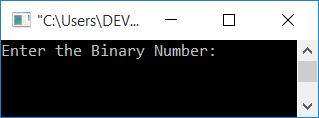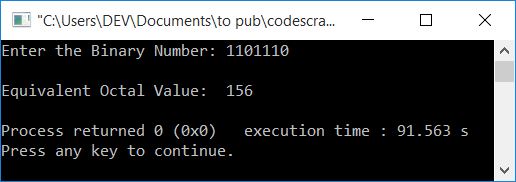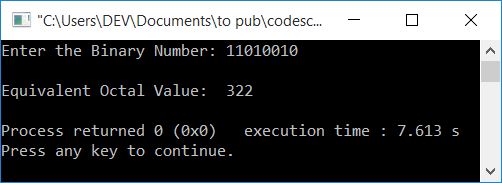- C++ Programming Examples
- C++ Programming Examples
- C++: Hello World
- C++: Get Input
- C++: Print Integer
- C++: Add two numbers
- C++: Add, Sub, Multiply, Div
- C++: Add Digits
- C++: Find Average and Percentage
- C++: Find Arithmetic Mean
- C++: Sum of n Natural Numbers
- C++: Sum of n Numbers
- C++: Square's Area and Perimeter
- C++: Rectangle's Area and Perimeter
- C++: Triangle's Area and Perimeter
- C++: Area and Circumference
- C++: Find Simple Interest
- C++: Fahrenheit to Celsius
- C++: Celsius to Fahrenheit
- C++: Print Prime Numbers
- C++: Reverse a Number
- C++: Swap Two Numbers
- C++: Print Multiplication Table
- C++: Find Factorial of a Number
- C++: Find Factors of a Number
- C++: Find HCF and LCM
- C++: Create a Calculator
- C++: Count Digits in a Number
- C++: First and Last Digit Sum
- C++: Product of Number Digits
- C++: Sum of Squares of Digits
- C++: Interchange Digits of Number
- C++ if-else Programs
- C++: Check Even or Odd
- C++: Check Prime or Not
- C++: Check Alphabet or Not
- C++: Check Vowel or Not
- C++: Check Leap Year or Not
- C++: Check Reverse equals Original
- C++: Check Perfect Number
- C++: Check Palindrome or Not
- C++: Check Armstrong or Not
- C++: Divisibility Test
- C++: Find Labor Wage
- C++: Find Discounted Price
- C++: Find Shipping Charge
- C++: Find Telephone Bills
- C++: Calculate Student Grade
- C++: Largest of Two Numbers
- C++: Largest of Three Numbers
- C++ Number Conversion
- C++: Decimal to Binary
- C++: Decimal to Octal
- C++: Decimal to Hexadecimal
- C++: Binary to Decimal
- C++: Binary to Octal
- C++: Binary to Hexadecimal
- C++: Octal to Decimal
- C++: Octal to Binary
- C++: Octal to Hexadecimal
- C++: Hexadecimal to Decimal
- C++: Hexadecimal to Binary
- C++: Hexadecimal to Octal
- C++ Pattern Programs
- C++: Pattern Programs
- C++: Print Diamond Pattern
- C++: Print Floyd's Triangle
- C++: Print Pascal's Triangle
- C++ Array Programs
- C++: 1D Array Program
- C++: Linear Search
- C++: Binary Search
- C++: Largest Element in an Array
- C++: Smallest Element in an Array
- C++: Find Second Largest Element
- C++: Find Second Smallest Element
- C++: Sum of All Elements
- C++: Multiply All Elements
- C++: Element in Even Position
- C++: Element in Odd Position
- C++: Print Even Numbers in Array
- C++: Print Odd Numbers in Array
- C++: Count Even or Odd Numbers
- C++: Sum of Even or Odd Numbers
- C++: Count Positive, Negative, Zero
- C++: Reverse an Array
- C++: Insert an Element
- C++: Delete an Element
- C++: Merge two Arrays
- C++: Bubble Sort
- C++: Selection Sort
- C++: Insertion Sort
- C++: Common Elements
- C++: 2D Array Programs
- C++: Add Two Matrices
- C++: Subtract Two Matrices
- C++: Transpose Matrix
- C++: Multiply Two Matrices
- C++: 3D Array Programs
- C++ String Programs
- C++: Print String
- C++: Find String Length
- C++: Compare Two Strings
- C++: Copy String
- C++: String Concatenation
- C++: Reverse a String
- C++: Delete Vowels from a String
- C++: Delete a Word from a String
- C++: Count Characters in a String
- C++: Count Words in a String
- C++: Frequency of Words
- C++: Remove Spaces from Strings
- C++: Sort a String
- C++: Uppercase to Lowercase
- C++: Lowercase to Uppercase
- C++: Swap Two Strings
- C++: Check the Anagram or Not
- C++: Capitalize All Words in a String
- C++: Get Numbers from a String
- C++ File Programs
- C++: Read a File
- C++: Write Content to a File
- C++: Append Data to a File
- C++: Read and Display File
- C++: Copy a File
- C++: Merge Two Files
- Count Characters in a File
- C++: Capitalize Every Word
- C++: List Files in Directory
- C++: Delete a File
- C++: Encrypt and Decrypt a File
- C++ Misc Programs
- C++: Print ASCII Value
- C++: Add Binary Numbers
- C++: Generate Random Numbers
- C++: Print a Smiling Face
- C++: Days into Years and Months
- C++: Add Two Numbers using Pointer
- C++: Print Fibonacci Series
- C++: Generate Armstrong Numbers
- C++: Find nCr and nPr
- C++: Get IP Address
- C++: Print Date and Time
- C++: Shutdown and Restart Computer
- C++ Programming Tutorial
- C++ Tutorial
C++ Program to Convert Binary to Octal
In this article, you will learn and get code for binary to octal conversion in C++. The program is written both with and without the use of functions.
But before starting the program, if you are not aware of the steps and formula used for the conversion, you can refer to Binary to Octal. You will find everything you require there.
Binary to Octal in C++
To convert a binary number to octal in C++ programming, you have to ask the user to enter any number in binary. and then convert it into its equivalent octal value as shown in the program given below.
The question is: write a program in C++ that receives any binary number and prints its equivalent octal value. Here is its answer:
#include<iostream> using namespace std; int main() { int binaryNum, octalDigit=0, octalNum[20]; int i=0, mul=1, chk=1, rem; cout<<"Enter the Binary Number: "; cin>>binaryNum; while(binaryNum!=0) { rem = binaryNum%10; octalDigit = octalDigit + (rem*mul); if(chk%3==0) { octalNum[i] = octalDigit; mul = 1; octalDigit = 0; chk = 1; i++; } else { mul = mul*2; chk++; } binaryNum = binaryNum/10; } if(chk!=1) octalNum[i] = octalDigit; cout<<"\nEquivalent Octal Value: "; for(i=i; i>=0; i--) cout<<octalNum[i]; cout<<endl; return 0; }
This program was build and run under Code::Blocks IDE. Here is its sample run:

Now supply the binary number input, say 1101110, and press the ENTER key to print its equivalent value in octal, as shown in the snapshot given below:

Here is another sample run with user input as 11010010:

The dry run of the above program with user input as 1101110 goes like this:
- Initial values, i = 0, mul = 1, chk = 1, octalDigit = 0.
- When the user enters a binary number, say 1101110, then it gets initialized to binaryNum. Therefore binaryNum=1101110
- Now, because the condition (of the while loop) is binaryNum!=0 or 1101110!=0, evaluates to be true, therefore program flow goes inside the loop.
- Inside the loop, all the statements gets executed one by one, starting from the very first one.
- In other words, binaryNum%10 or 1101110%10 or 0 is initialized to rem. So rem=0.
- octalDigit + (rem*mul) or 0 + (0*1) or 0 is set to octalDigit. So octalDigit=0.
- Now that the condition of the if statement, that is, chk%3==0 or 1%3==0 or 1==0, evaluates to be false, the program does not go inside the if's body, rather it goes to its else's body.
- Inside the else's body, mul*2 or 1*2 or 2 gets initialized to mul. Now mul=2
- And the value of chk gets incremented. Now chk=2
- Finally, the while loop's final statement is executed, and binaryNum/10 or 1101110/10 or 110111 is initialized to binaryNum. Now binaryNum=110111
- Now the program flow goes back and evaluates the condition of the while loop again with the new value of binaryNum.
- The second time, too, the condition evaluates to be true, so the program flow again goes inside the loop.
- This process continues until the condition of the while loop evaluates to be false. That is, the value of binaryNum becomes equal to 0.
- In this way, here are the values after each evaluation of the while loop:
- rem=0, octalDigit=0, mul=2, chk=2, binaryNum=110111
- rem=1, octalDigit=2, mul=4, chk=3, binaryNum=11011
- rem=1, octalDigit=6, octalNum[0]=6, mul=1, octalDigit=0, chk=1, i=1, binaryNum=1101. The condition of if also evaluates to be true at this point.
- rem=1, octalDigit=1, mul=2, chk=2, binaryNum=110
- rem=0, octalDigit=1, mul=4, chk=3, binaryNum=11
- rem=1, octalDigit=5, octalNum[1]=5, mul=1, octalDigit=0, chk=1, i=2, binaryNum=1. Once again, the condition of the if evaluates to be true.
- rem=1, octalDigit=1, mul=2, chk=2, binaryNum=0
- Because the value of binaryNum is 0 now, the condition of the while loop evaluates to be false, so the while loop evaluation gets ended.
- Now the condition of if, that is, chk!=1, gets evaluated. Because the condition chk!=1 or 2!=1 evaluates to true, the value of octalDigit or 1 is set to octalNum[2].
- Using the for loop, the value of octalNum[] is now printed from the last to the 0th index.
- That is why the value of octalNum[2] gets printed first. Following that, octalNum[1] and octalNum[0] are printed. That equals or prints 156 as output.
Binary to octal in C++, using a user-defined function
Let's create another program that does the same job using a user-defined function, BinaryToOctal(). This function receives a binary number as its argument and converts it into its equivalent octal value.
#include<iostream> using namespace std; void BinaryToOctal(int); int i=0, octalNum[20]; int main() { int binaryNum; cout<<"Enter any Binary Number: "; cin>>binaryNum; BinaryToOctal(binaryNum); cout<<"\nEquivalent Octal Value: "; for(i=i; i>=0; i--) cout<<octalNum[i]; cout<<endl; return 0; } void BinaryToOctal(int binaryNum) { int octalDigit=0, mul=1, chk=1, rem; while(binaryNum!=0) { rem = binaryNum%10; octalDigit = octalDigit + (rem*mul); if(chk%3==0) { octalNum[i] = octalDigit; mul = 1; octalDigit = 0; chk = 1; i++; } else { mul = mul*2; chk++; } binaryNum = binaryNum/10; } if(chk!=1) octalNum[i] = octalDigit; }
It will produce the same output as the previous program. You can also convert binary to octal in an indirect way. That is, first binary to decimal and then decimal to octal.
The same program in different languages
« Previous Program Next Program »